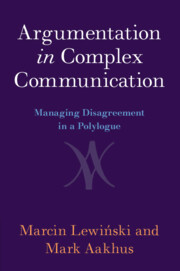Book contents
- Argumentation in Complex Communication
- Argumentation in Complex Communication
- Copyright page
- Contents
- Figures
- Preface
- Part I Seeking, Seeing, and Embracing Polylogue
- Chapter 1 Seeking Polylogue
- Chapter 2 The Dyadic Reduction
- Chapter 3 Seeing Polylogue
- Chapter 4 Embracing Polylogue
- Part II Analyzing, Evaluating, and Designing Polylogue
- References
- Index
Chapter 4 - Embracing Polylogue
from Part I - Seeking, Seeing, and Embracing Polylogue
Published online by Cambridge University Press: 22 February 2023
- Argumentation in Complex Communication
- Argumentation in Complex Communication
- Copyright page
- Contents
- Figures
- Preface
- Part I Seeking, Seeing, and Embracing Polylogue
- Chapter 1 Seeking Polylogue
- Chapter 2 The Dyadic Reduction
- Chapter 3 Seeing Polylogue
- Chapter 4 Embracing Polylogue
- Part II Analyzing, Evaluating, and Designing Polylogue
- References
- Index
Summary
This chapter investigates how scholars have previously challenged dyadic reductions and directly or indirectly embraced polylogue – often simply called “multiparty conversation” – as an alternative ontology for communication. The chapter is divided into two basic parts. First, the varied understandings of polylogue produced in the literature are discussed. This review reveals some key limitations of the extant literature on polylogues and clarifies terminological confusions. Second, drawing from a variety of relevant literature a nonexhaustive but compelling list of eleven polylogical facts instrumental to understanding what is at stake when people engage in polylogues is presented. These polylogical facts extend the framework by demonstrating both what is reduced in dyadic reductions of argumentation while the complex communicative phenomena that are at stake when people engage in polylogues.
Keywords
- Type
- Chapter
- Information
- Argumentation in Complex CommunicationManaging Disagreement in a Polylogue, pp. 89 - 116Publisher: Cambridge University PressPrint publication year: 2022

